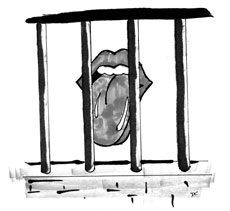Column: Against all adversity

Tim Eggerding
January 21, 2005
The Anne Frank House in Amsterdam, Holland, shares the artifacts and stories of a Jewish family that went into hiding during World War II in an attempt to escape the horrors of Nazi Germany. The stories are touching and can very nearly bring a visitor to tears. Of course the museum includes Anne’s famous diary, which she kept until her deportation to a concentration camp in Poland where she died shortly before the end of World War II.
What I didn’t expect was the exhibition at the end of the tour; “Out of Line” weighs the benefits and consequences of the freedom of speech and a ban on discrimination. The exhibit depicts a number of examples of hate speech via short documentaries at the end of which viewers vote in favor of free speech or in favor of protecting of people’s feelings by censoring various individuals or ideas. It seems foolhardy to question the freedom of speech or whether people have the right to live without subjection to discrimination.
Yet the discrimination, as defined by the exhibit, is not defined as treating a person differently on a basis other than individual merit. The exhibit would sacrifice freedom of speech via censorship in order to protect people from insulting opinions. Among the examples given were rap artist Eminem’s lyrics, which are famous for commentary against gays and women.
It is understandable that a museum that pays its homage to victims of a hate-perpetrated genocide pushes an agenda against free speech. Their interest is to protect themselves. When a memory as traumatic as the Holocaust is still fresh in their minds, giving up liberties often takes a back seat. What is unacceptable is that governments follow suit.
In both France and Germany it is illegal to make comments denying the Holocaust, and one can be imprisoned for making such remarks. The backlash of these laws is manifest in such high-profile persons as French politician Jean-Marie Le Pen, who mobilized a shockingly large portion of the French population in recent elections with a fascist-leaning agenda. It is much easier for a politician to garner support by becoming a martyr to the free speech cause, which can then allow him to push a hateful agenda with disgruntled citizens who fear overarching governmental control of life.
Get The Daily Illini in your inbox!
The U.S. model of allowing free and hateful speech to reach public airwaves and abound in cyberspace, while facing constant public ridicule, is far more effective. Our system allows for public shaming of figures who offend, while simultaneously denying them the martyrdom of jail time, which gives them a sympathetic quality.
One of my favorite memories of growing up in a Southern city with ever-palpable racial tensions was the time white supremacist David Duke spoke at a mall in spite of prior public outrage. In the end, he faced a crowd of around three supporters and over 100 protestors. That’s the result of free speech and shows that allowing all speech gives power to the minority by becoming the ostracized group others sympathize with, instead of giving that role to hate-mongering figures.
Recently, the Ku Klux Klan of Missouri won a court battle to give them the right to clean a portion of the state’s highways. The likelihood of the Klan’s wanting to clean highways is dubious at best, while it’s far easier to assume they wanted to create a ruckus. The state should have simply allowed them to participate and let the group improve at least one aspect of public life instead of giving them a victory.
Another scary example of European reaction to the Holocaust is the European Union – in reaction to Britain’s Prince Harry’s wearing a swastika – opening the possibility of banning the swastika, a symbol whose original Sanskrit meaning, svastika, was of good fortune. The symbol, which has been found on 2000-year-old Jewish temples in Palestine and in 20th-century American literature’s The Great Gatsby (adorning the door of a Jewish businessman), is speculated as having been used deliberately by Hitler to poison its original meaning according to researchers at the University of Michigan and Stanford. Instead of banning the symbol, the European Union should look into funding education programs on the positive meanings of the swastika and take it back as a metaphoric “up yours” to neo-Nazi groups around the world.
One of the easiest ways to limit a society’s tolerance and world growth toward community is to exclude the free speech of haters and the subsequent public backlash that puts those haters in their place.
David Solana is a senior in LAS. His column appears on Thursdays. He can be reached at [email protected].






